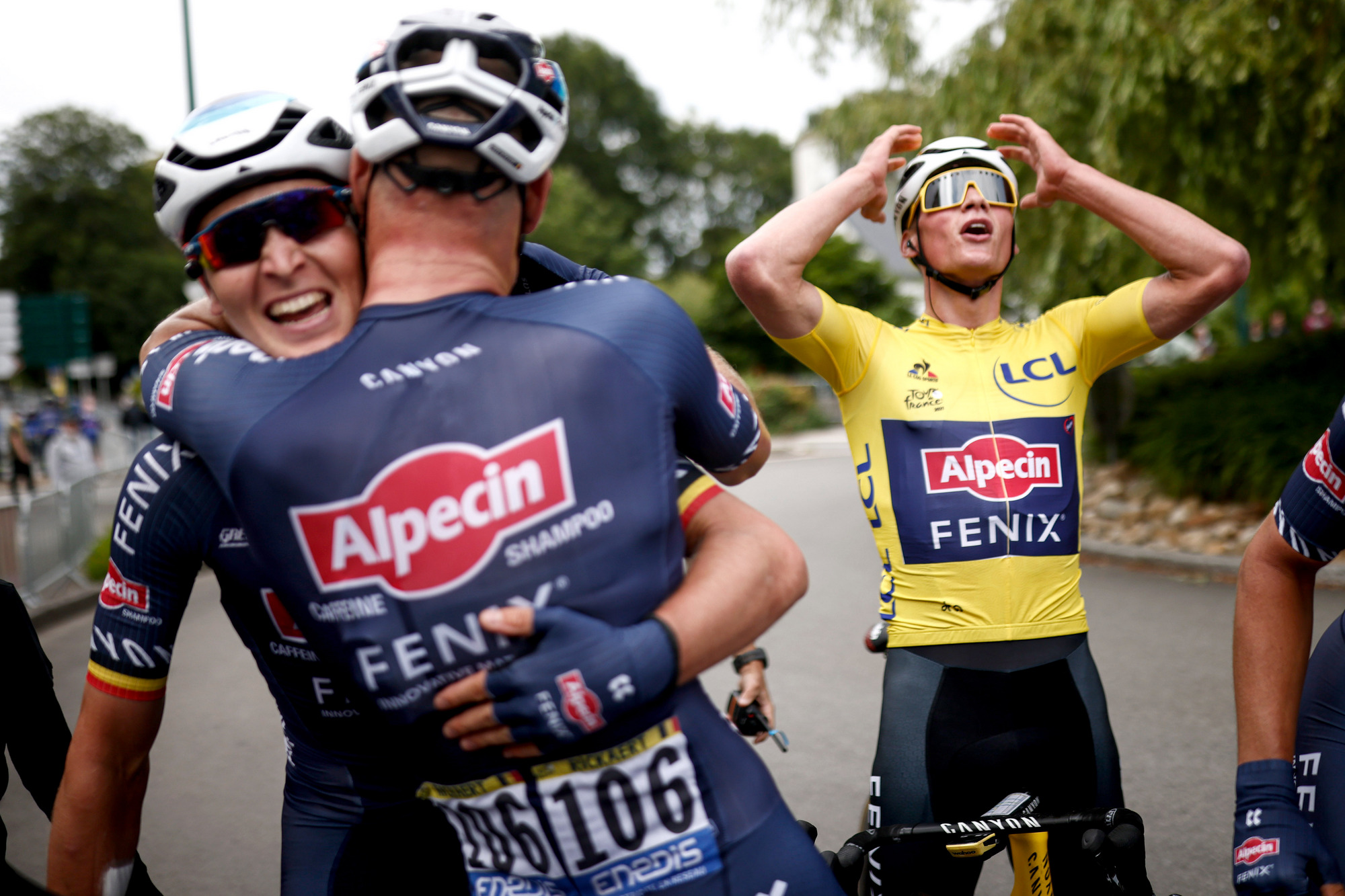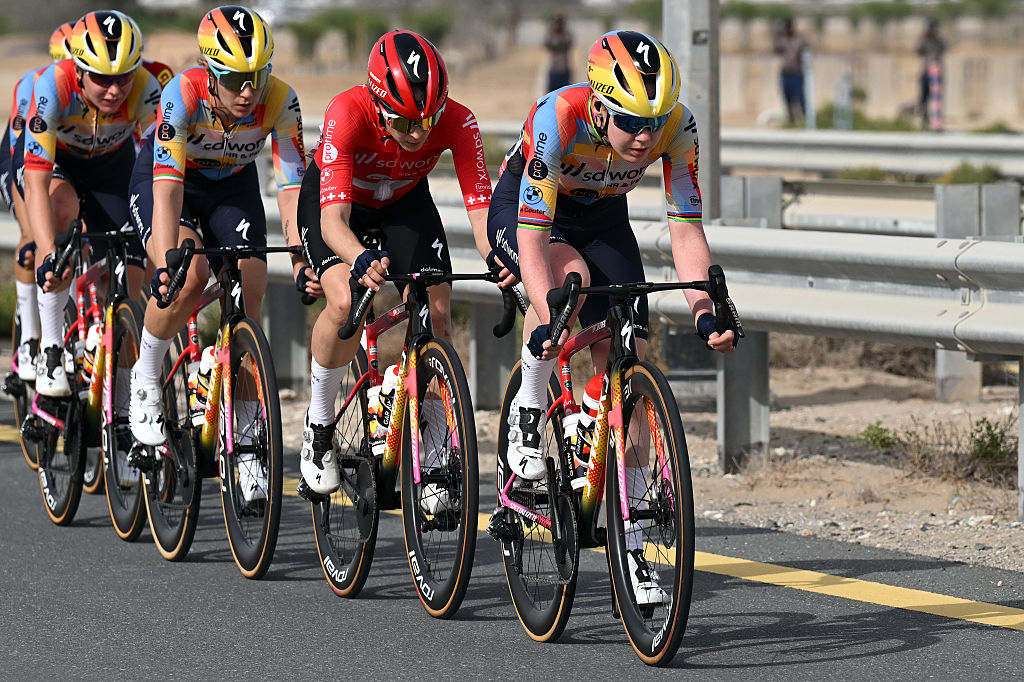Tour de France leader Van der Poel: I knew there was going to be trouble
Yellow jersey led out stage winner Merlier to 'stay out of trouble and return favour to teammates'

The latest race content, interviews, features, reviews and expert buying guides, direct to your inbox!
You are now subscribed
Your newsletter sign-up was successful
Tour de France leader Mathieu van der Poel (Alpecin-Fenix) has said that the crash-filled finales of this year’s race have their explanation in a tumultuous cocktail of high pressure and nerves at the biggest race in the world, and the consequences of general classification racers and sprinters simultaneously fighting for forward positions in the closing kilometres of each stage.
Van der Poel himself stayed out of trouble on stage 3, leading Alpecin-Fenix teammate Tim Merlier out in the last kilometre to victory, the second for the German squad in as many days, while Jasper Philipsen was second and Van der Poel himself retained the yellow jersey.
But behind him and Merlier and a dozen or so riders lucky enough to escape the crashes that plagued Monday’s racing to within sight of the line, Van der Poel recognised it had been a “very dangerous, very hectic stage,” which came after stage 1’s two major pileups, as well, as a string of other other minor falls.
As for what could be at least help this situation, Van der Poel gave a cautious possible thumbs up, too, to a proposal made by Deceuninck-QuickStep’s Tim Declerq before the stage started, to neutralise GC times eight kilometres from the line.
“For sure it’s something special to wear yellow jersey in this country, it’s a big deal and I’m really happy with how the day went,” Van der Poel said about dealing with his sensations to be in the lead of the Tour de France and then noted the situation with the crashes. “Of course it was very dangerous, very hectic and we can be happy once again [we] didn’t crash because a lot of guys went down.
"I did the lead-out for Tim [Merlier], and also I knew I had to stay in the group rather than drop back, because Julian Alapahilippe [Deceuninck-QuickStep, second overall] was up there, so I had to stay in there, and that was hard for me.”
Groupama-FDJ’s outspoken director Marc Madiot was furious after the finish at what he saw as the excessive dangers of the stage, saying that such situations could not be allowed to continue and that it was the kind of scenario that would put parents off allowing their children to take part in bike races.
The latest race content, interviews, features, reviews and expert buying guides, direct to your inbox!
Asked whether he agreed with Madiot and what could be at the root of so many crashes, Van der Poel answered the second part of the question by saying, “it’s a bit of everything. For sure it’s the biggest race, everyone is nervous, you have GC guys fighting against sprinter teams. For sure the last 10 kilometers was a bit fast and stretched out, but you also see big crashes on straight roads. For sure it’s a dangerous sport, if you see how many guys crashed today, it’s dangerous.”
As for Declerq’s pre-stage idea to stop the clock for the GC eight kilometres from the finish, Van der Poel gave a balanced answer saying, “I don’t think that was a bad idea, it was a very fast, technical descent towards the finish line, and I knew there was going to be trouble [when] GC guys start fighting against the sprinters teams.
“It’s always something I find difficult to measure, it’s easier if you don’t have to do it the last eight kilometres, it would maybe have saved a lot of trouble for some riders.”
However, later he pointed out that the ‘eight-kilometre’ rule would, too, have its limitations too. When asked what could be possible solutions to the dangers the sport presents, he said he did not know yet.
"It’s always difficult to have an opinion and we’ve had already a lot of finals where riders have crashed. Maybe if the eight-kilometre mark was there” - for neutralising times - “then it would be different, but of course you move the problem up a bit to the eight-kilometre mark," Van der Poel said.
“We race on open roads that we don’t always know, or what’s coming up, and the speed is so high these days that it can be dangerous.”
For Van der Poel himself, the last 24 hours have been an emotional rollercoaster. After taking the yellow jersey on Sunday to honour his grandfather, Raymond Poulidor - who never held the Tour lead in his distinguished career - Monday was his first day wearing the maillot jaune on the roads of France itself.
Regarding what he remembered the most of the last 24 hours he said, “that’s a difficult one. I have a lot of things coming my way, but I think the most emotional moment was when I had my phone and I saw a lot of photos coming through of my Grandad. I think that was maybe the hardest moment of the day for me.”
Tomorrow, incidents notwithstanding, should not be such a problem for remaining in yellow. But regarding his own chances of staying in the maillot jaune in the upcoming time trial and if they were now better following the crashes and delays for riders like Tadej Pogačar (UAE Team Emirates) and Geraint Thomas (Ineos Grenadiers), Van der Poel answered that he had yet to look at the GC classification.
"The only name that comes to mind is [Wout] Van Aert [Jumbo-Visma]” - (fourth overall, Ed.) “I think that he is still close and one of the guys that can take the jersey off me in the TT."
Returning to his own strategy on stage three, Van der Poel said he had ridden on the front in the last few kilometres for two reasons, “to stay out of trouble and to pay back the team.
“It was a very hectic final and I didn't want to get caught up in crashes. I also wanted to return a favour to my teammates, and the guys who ride for me know I like to do that. So I did my best with that today.”
And on a second, massively-fraught stage, on both counts - both for the yellow and the stage - it proved to be just enough.
Alasdair Fotheringham has been reporting on cycling since 1991. He has covered every Tour de France since 1992 bar one, as well as numerous other bike races of all shapes and sizes, ranging from the Olympic Games in 2008 to the now sadly defunct Subida a Urkiola hill climb in Spain. As well as working for Cyclingnews, he has also written for The Independent, The Guardian, ProCycling, The Express and Reuters.

